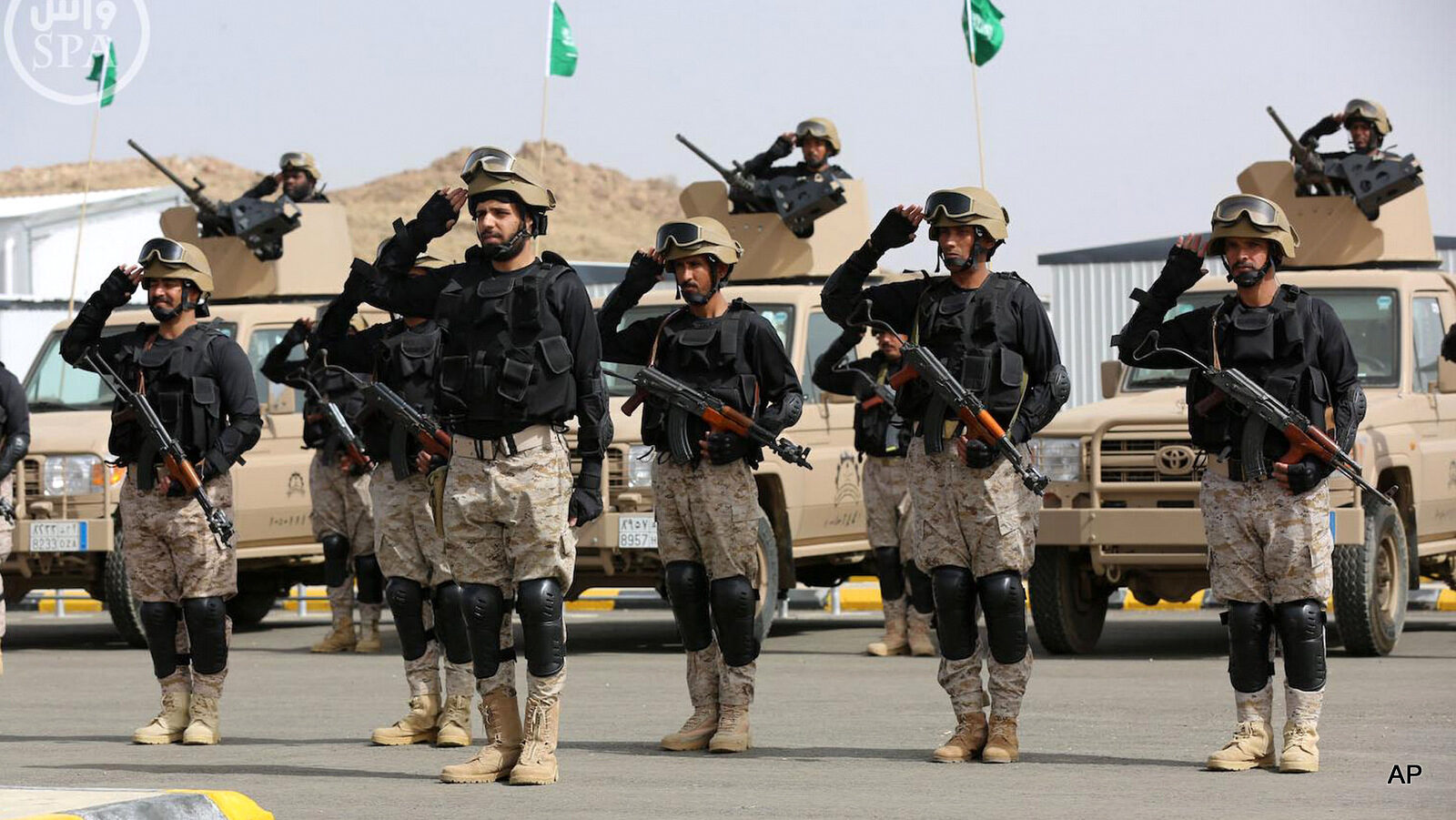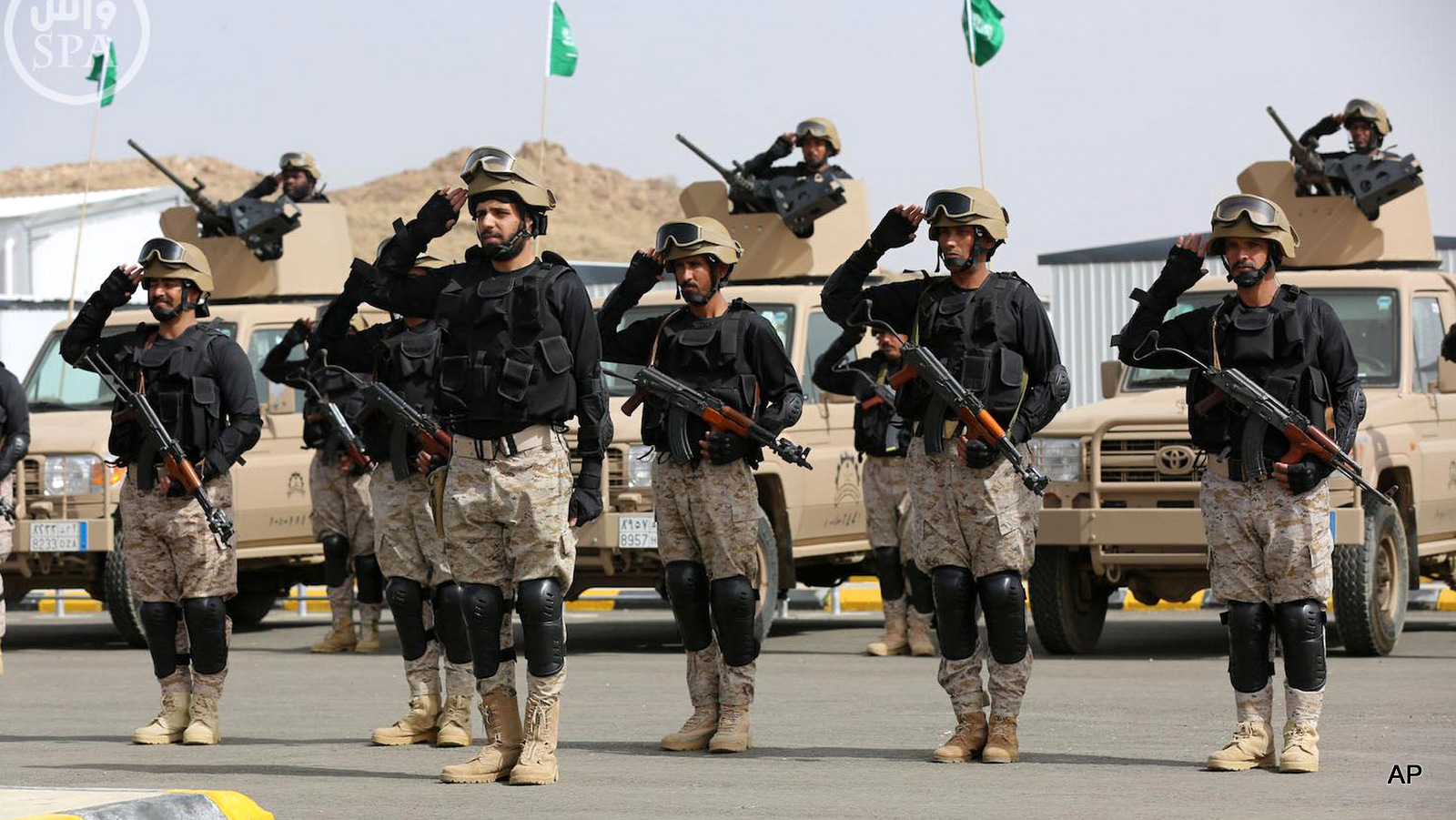 In this photo provided by the Saudi Press Agency (SPA), Royal Saudi Land Forces and units of Special Forces of the Pakistani army take part in a joint military exercise called “Al-Samsam 5” in Shamrakh field, north of Baha region, southwest Saudi Arabia, Monday, March 30, 2015.
In this photo provided by the Saudi Press Agency (SPA), Royal Saudi Land Forces and units of Special Forces of the Pakistani army take part in a joint military exercise called “Al-Samsam 5” in Shamrakh field, north of Baha region, southwest Saudi Arabia, Monday, March 30, 2015.
KARACHI, Pakistan — Pakistani Prime Minister Nawaz Sharif’s government is trying to figure out how to stay in the good graces of Saudi Arabia, a key ally which has sought Pakistani military assistance, without inserting itself into the Saudi-led coalition targeting the Houthis in Yemen.
The Iran-backed Houthis took over Yemen’s capital city, Sanaa, six months ago and now control much of the impoverished country on the Arabian Peninsula. Saudi Arabia launched overnight air strikes on March 26 (local time) in coordination with a coalition of Arab powers in a bid to restore power to Yemeni President Abed Rabbo Mansour Hadi, who resigned in January and fled to Saudi Arabia on March 25.
Saudi Arabia announced on March 26 that Pakistan and Sudan would also be joining the coalition, and a senior Pakistani official made a similar claim on March 30. Yet Pakistan’s foreign ministry has denied each of those claims, asserting that Islamabad is still reviewing its options.
Pakistan’s defense minister Khawaja Asif, accompanied by top military and civilian personnel, arrived in Riyadh on Tuesday to “better understand” the Saudi-led “Operation Decisive Storm” in Yemen.
An official communique issued by Sharif’s office on Thursday warned of a strong response from Pakistan in light of “any isolation of Saudi Arabia’s territorial integrity.” It also condemned the “non-state actors” in Yemen that have moved to overthrow a legitimate government and called on all parties to work toward a peaceful resolution.
Further, the statement said all decisions on the matter would be taken in keeping with the wishes of the people of Pakistan and called for a joint session of parliament to convene on April 6.
On Friday, Sharif reiterated Pakistan’s support for Saudi Arabia. Speaking from Ankara, where he met with the Turkish prime minister to discuss the unfolding crisis in Yemen, Sharif declared, “We have agreed to extend all possible support for the defense of Saudi Arabia’s sovereignty and territorial integrity.”
Thus, as of Friday, it remained unclear whether Pakistan would be committing troops to the Saudi-led offensive. But considering Pakistan’s history of joining Saudi-led initiatives, many believe Pakistan will ultimately acquiesce.
“I think Pakistan will send troops, even if it is in form of tokenism. And also it has been vocal and assertive about sending troops,” said Ambreen Agha, assistant researcher at Delhi-based Institute for Conflict Management.
Pakistan’s experience in fighting Saudi Arabia’s battles
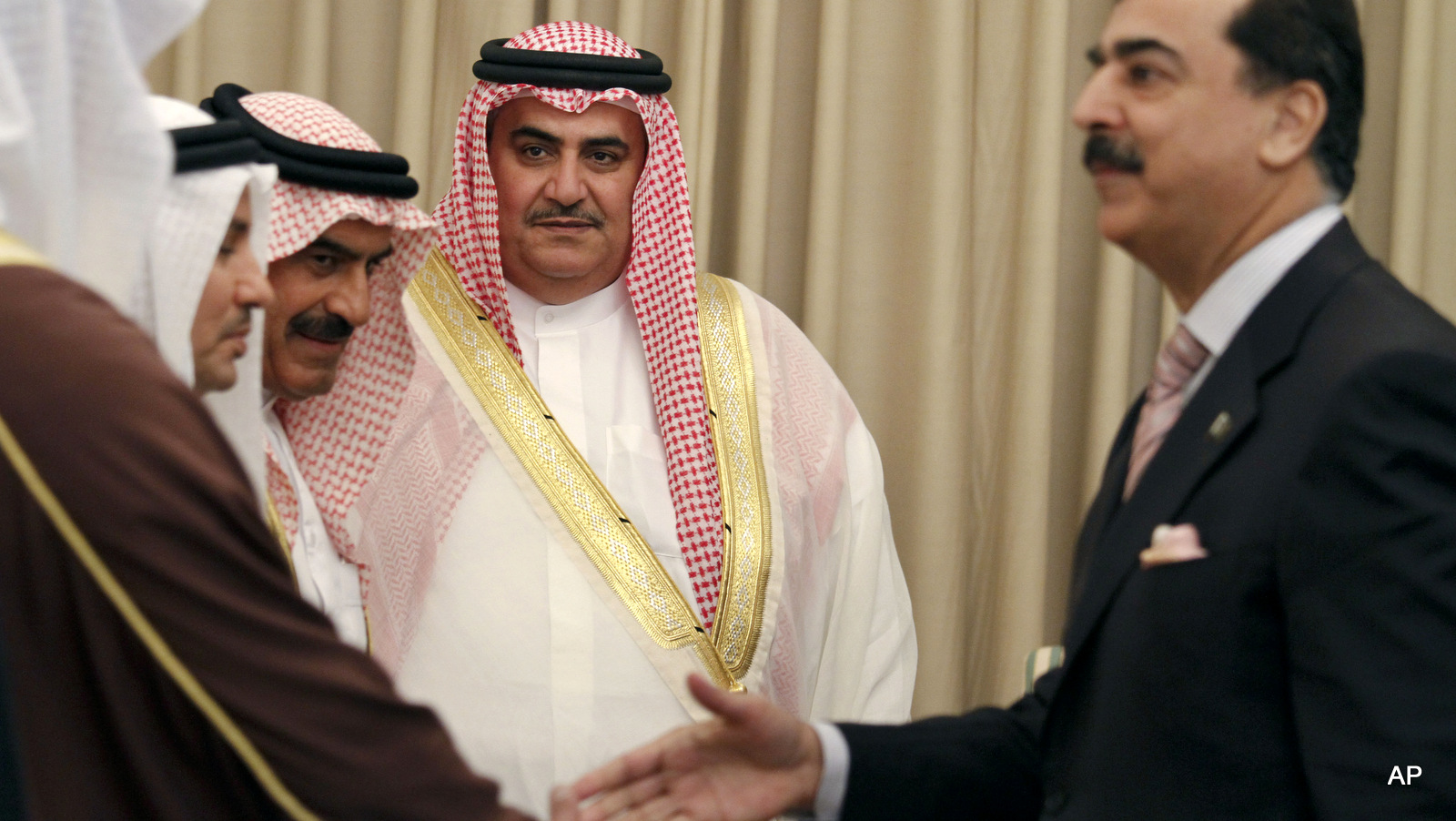 Bahrain’s Foreign Minister Khalid Bin Ahmed Al Khalifa, centre left, introduces his delegate members to Pakistani Prime Minister Yousuf Raza Gilan. Pakistan played a big role in quelling Bahrain’s mostly Shia pro-democracy protests at the behest of the Saudi government.
Bahrain’s Foreign Minister Khalid Bin Ahmed Al Khalifa, centre left, introduces his delegate members to Pakistani Prime Minister Yousuf Raza Gilan. Pakistan played a big role in quelling Bahrain’s mostly Shia pro-democracy protests at the behest of the Saudi government.
The concern in Pakistan is that the personal relationship between Sharif and the Saudi royal family is preventing the Sharif administration from flatly rejecting the calls of Al Saud. Ousted in a military coup in 1999, Sharif lived in exile in Saudi Arabia with his family until 2008.
These close ties are also seen in Saudi aid to Pakistan, which included a “gift” of $1.5 billion last year.
Yet Pakistan had a history of heeding Saudi calls for military assistance well before Sharif ever came to power. According to a 2008 Brookings report:
“Pakistan has provided military aid and expertise to the kingdom for decades. It began with help to the Royal Saudi Air Force to build and pilot its first jet fighters in the 1960s. Pakistani Air Force pilots flew RSAF Lightnings that repulsed a South Yemeni incursion into the kingdom’s southern border in 1969. In the 1970s and 1980s up to 15,000 Pakistani troops were stationed in the kingdom, some in a brigade combat force near the Israeli-Jordanian-Saudi border.”
More recently, Pakistan sent 2,500 police and retired army personnel to quell a 2011 pro-democracy uprising in Bahrain — an uprising which Saudi Arabia was also instrumental in fighting.
Acknowledging Islamabad and Riyadh’s past military cooperation, Agha argued:
“The historical realities of 1969 — when Pakistan’s army came to Saudi Arabia’s aid when South Yemen invaded part of the kingdom — are far more different than what they are today. Pakistan is itself embroiled in a war within. Any external military adventurism will prove to be the biggest debacle, both militarily and economically. No matter how far Islamabad limits its numbers of personnel deployed in Yemen, it will only add to Pakistan’s fledgling peace efforts within.”
Indeed, Pakistan’s military is already being stretched thin by an ongoing extremist insurgency near its border with Afghanistan.
Additionally, as Hasan Askari Rizvi, an independent political analyst and professor emeritus of Political Science at Punjab University in Lahore, told MintPress, there’s a major difference in the current campaign: It’s being carried out beyond Saudi borders.
“Saudi Arabia is seeking Pakistan’s cooperation for its regional role and for assignments beyond the territorial boundaries of the kingdom, which is different from Pakistan-Saudi military cooperation in the past,” Rizvi explained.
Rizvi added that the kingdom’s internal security was in no way threatened by the rise of the Houthis. Saudi Arabia has taken “preemptive and unilateral military action” in the civil strife in Yemen, he argues.
Friends or foes?
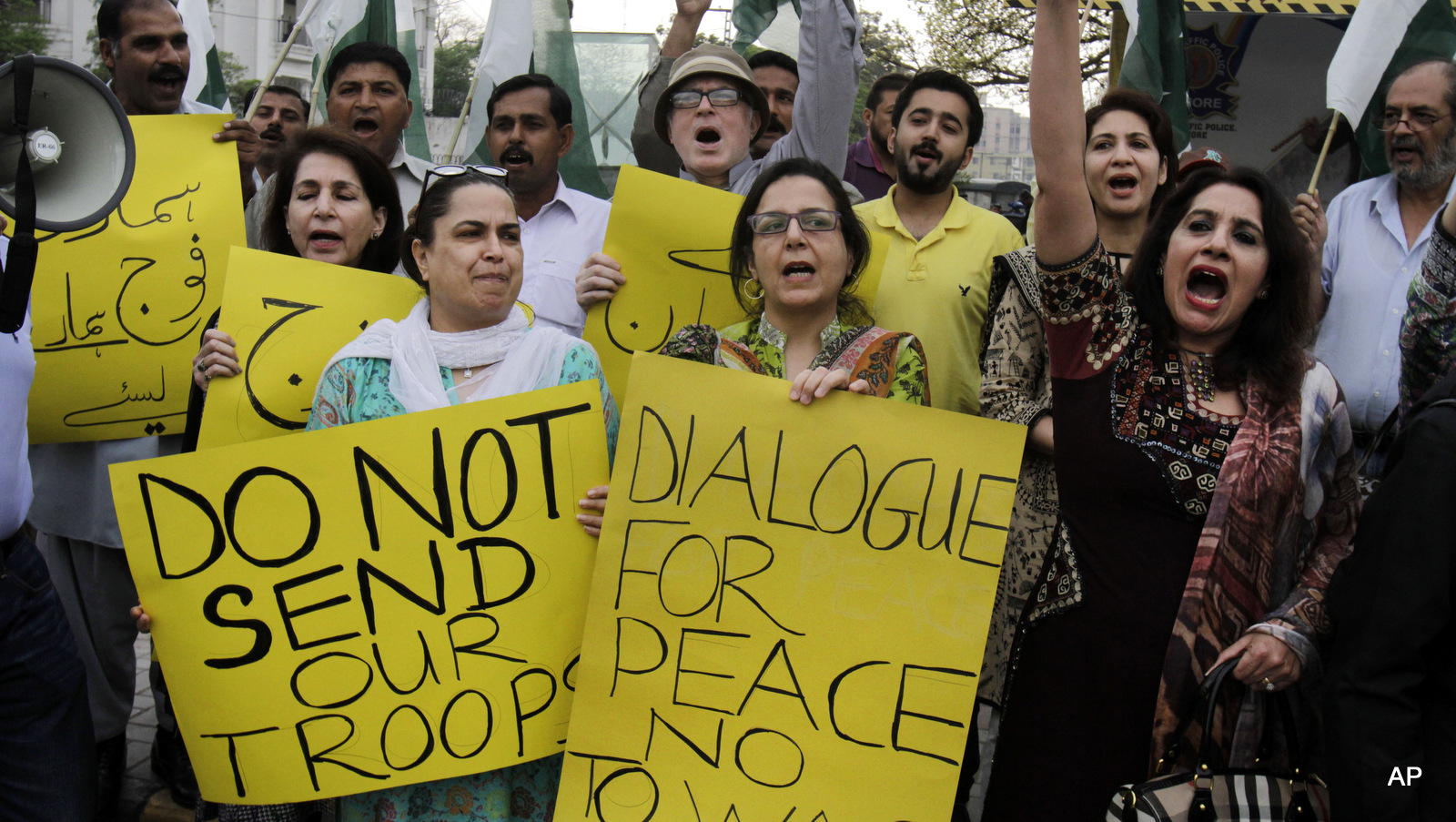 Members of Pakistan’s civil society chant slogans against the Saudi-led coalition targeting Shiite rebels in Yemen, during a demonstration, in Lahore, Pakistan, Monday, April 6, 2015. A Saudi-led coalition targeting Shiite rebels in Yemen has asked Pakistan to contribute soldiers, Pakistan’s defense minister said Monday, raising the possibility of a ground offensive in the country.
Members of Pakistan’s civil society chant slogans against the Saudi-led coalition targeting Shiite rebels in Yemen, during a demonstration, in Lahore, Pakistan, Monday, April 6, 2015. A Saudi-led coalition targeting Shiite rebels in Yemen has asked Pakistan to contribute soldiers, Pakistan’s defense minister said Monday, raising the possibility of a ground offensive in the country.
When it comes to whether Pakistan should entangle itself in Saudi Arabia’s offensive in Yemen, an ongoing opinion poll on the website of The Express Tribune reveals a sharp divide. As of Friday afternoon, a total of 7,239 votes had been cast: 3,651 say Pakistan should not commit, while 3,588 believe it should.
“Pakistan will only be looked down as an insane country that is willing to rent its army when its own house is on fire,” Naeem Sadiq, a businessman based in Karachi, asserted. “Our involvement will generate a new set of enemies, including Iran, that has traditionally held good relations with Pakistan.”
“Why take on another problem?” asked Juzer Amreli, another businessman, who was among the 500 Pakistanis recently evacuated from Yemen. “There is much respect for us in Yemen, but more importantly, for Yemenis, whether they are Shias, Sunnis or Houthi rebels, Yemen comes first.”
Amreli told MintPress that when the evacuees reached the port city of al-Hudaydah, half the airport had been destroyed by the Saudi-led bombing campaign. It was the Houthis who ensured their safe return.
“Just when the plane doors closed and we were preparing for take-off, the airplane was stopped and the pilot informed to accommodate another seven Pakistani passengers who had also managed to reach the airport,” he said. “The news that Saudi Arabia had asked Pakistan to join its coalition army had spread and we all could have been used as bargaining chips by the rebels. Instead, they allowed us to leave their country safely.”
Saudi operation neither justified nor legitimate
Riyadh is threatened by Tehran’s growing regional influence, particularly in light of the successful negotiations between Iran and the P5+1 (the United States, United Kingdom, France, China and Russia, plus Germany), which announced Thursday that a deal had been reached on Iran’s nuclear program.
“All this is making them [Riyadh] insecure. The attack on Yemen is not just a signal to Iran but also to the U.S. to indicate who still yields the most influence in the region,” said Fahd Ali, assistant professor of Social Development and Policy at Karachi’s Habib University.
Abdul Qayyum Khan Kundi, who is affiliated with Imran Khan’s Pakistan Tehreek-e-Insaf (PTI), a political party that staged months-long anti-government protests in Islamabad last year, offered a similar assessment.
“Saudi Arabia was looking for an opportunity to check the rise of Iranian influence in Middle East and Yemen. It provided the perfect theater to send a message to Iran that they have to contain their regional ambitions,” Kundi told MintPress.
Whether Iran got the message or not, Kundi says, only time will tell.
Offering a helping hand
Tehran’s rising star has been prompting Saudi concerns in recent years. Between 2013 and 2014, Saudi Arabia’s arms imports increased by 54 percent to $6.46 billion, making it the world’s largest importer of defense equipment.
Writing in The New York Times’ opinion pages on March 26, John Bolton, former U.S. ambassador to the United Nations, argued that a nuclear-capable Iran would prompt a regional arms race. And Saudi Arabia, a U.S. ally in the region, would feature strongly in such a race. Bolton explains:
“No way would the Sunni Saudis allow the Shiite Persians to outpace them in the quest for dominance within Islam and Middle Eastern geopolitical hegemony. Because of reports of early Saudi funding, analysts have long believed that Saudi Arabia has an option to obtain nuclear weapons from Pakistan, allowing it to become a nuclear-weapons state overnight. Egypt and Turkey, both with imperial legacies and modern aspirations, and similarly distrustful of Tehran, would be right behind.”
In light of Thursday’s deal, it’s more important than ever for Riyadh to have Pakistan on its side, as Pakistan is the only Muslim nation capable of countering a nuclear-capable Iran.
“Riyadh will be anxious about geopolitical hegemony in the region, now that the deal has been signed,” said Agha.
The U.S. has imposed successive rounds of sanctions on Iran since the 1979 hostage crisis at the U.S. Embassy in Tehran. In 2006, in response to Iran’s failure to comply with International Atomic Energy Agency regulations, the U.N. imposed sanctions on the Islamic Republic to curtail its trade in nuclear-related materials and technologies, as well as to freeze the assets of persons and businesses believed to be helping to advance Iran’s nuclear program. Over the following years, the U.N. continued to toughen these sanctions, and the U.S., European Union and other individual countries also stepped up sanctions terms.
Under the Iran-P5+1 agreement, in exchange for sanctions relief, Iran will reduce its number of centrifuges by approximately two-thirds. The country also will not enrich uranium over 3.67 percent or build any new facilities for the purpose of enriching uranium for at least 15 years.
Pointing fingers misses the point: An unfolding humanitarian crisis
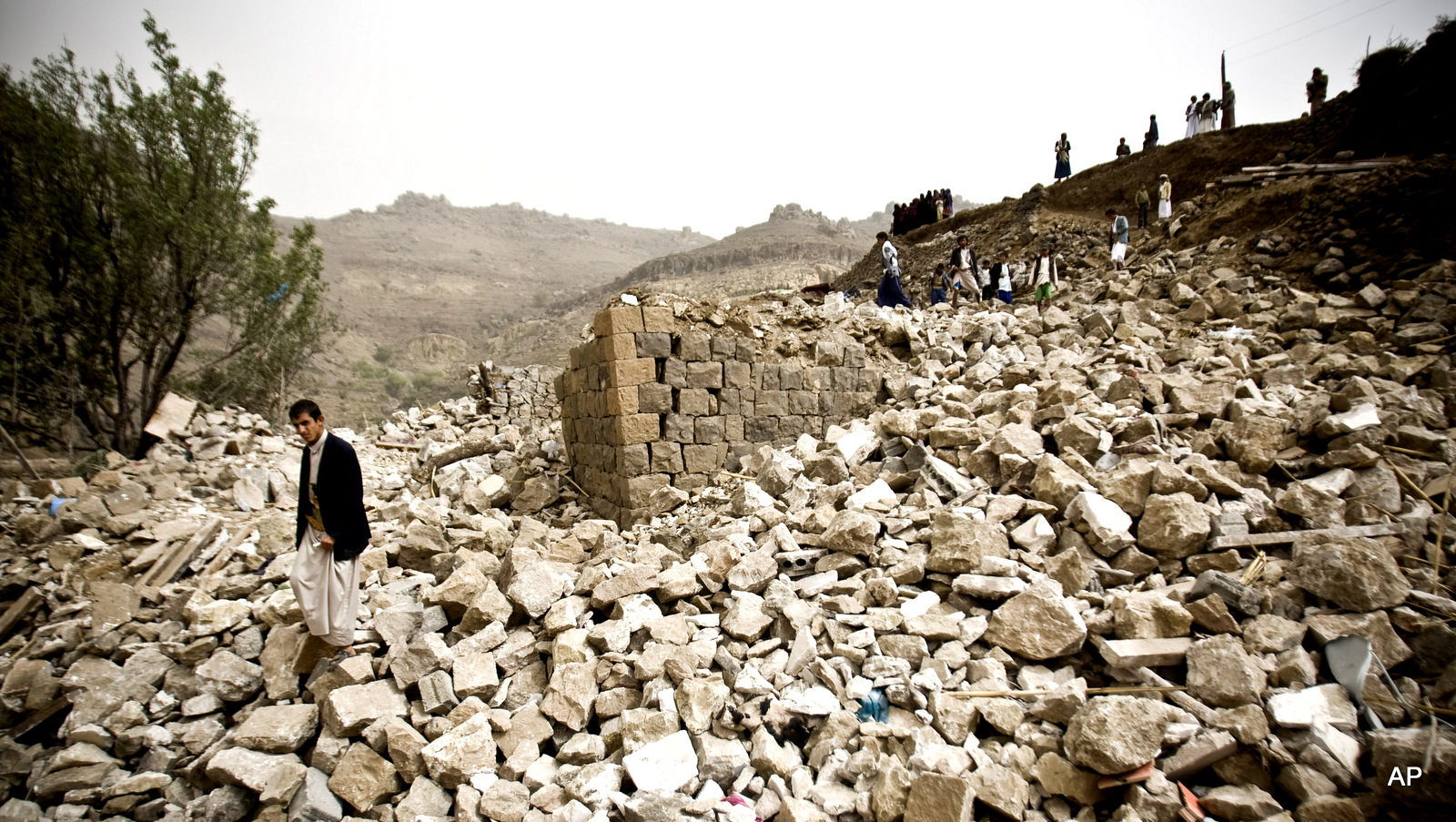 Yemenis search for survivors in the rubble of houses destroyed by Saudi-led airstrikes in a village near Sanaa, Yemen.
Yemenis search for survivors in the rubble of houses destroyed by Saudi-led airstrikes in a village near Sanaa, Yemen.
While the instability in Yemen has provided Riyadh an opportunity to consolidate an anti-Iran coalition, it has also sent a message to Washington that Saudi Arabia no longer depends on the U.S. In taking sides, though, many seem to have overlooked the humanitarian crisis in the making.
“The solution to Yemen’s current humanitarian crisis that has emerged after [the recent instability] lies within,” Agha said. “It is the internal players who will bring enduring peace through a political solution. However, the external players can limit their roles to constructive rehabilitation post-conflict.”
A number of analysts assert that the Houthis rose to power as a result of repression and are not actually Iranian proxies.
“Passing the buck to Iran is absolving the state from all responsibilities,” said Agha. “All internal upheavals are a result of state failure. And that perhaps may have been channeled by external forces.”
Meanwhile, some say Iran is flexing its muscle by meddling in the affairs of the Arab world and pitting the Houthi Shiites against the Saudi Sunnis. Yet others, like Mahdi Darius Nazemroaya, say instability in Yemen was orchestrated by the U.S. and Saudi Arabia. Writing for the Centre for Research on Globalisation, the geopolitical analyst asserts:
“If anyone is engaged in sectarianism as a policy, it is the U.S. and its Arab petro-sheikdom allies. Both the U.S. and Saudi Arabia had engaged the Houthis earlier and used them against the Muslim Brotherhood in Yemen. Additionally, during the Cold War both Washington and the House of Saud tried to use the Yemeni Shiites against the republicans in North Yemen and the People’s Democratic Republic of Yemen in the south. It is when the Houthi movement demonstrated that it was not going to be a client to Washington or Riyadh, that the U.S. and Saudi Arabia became hostile towards it.”
Justifying Tehran’s position, Fahd Ali, of Karachi’s Habib University, explained that Iran is “surrounded by an imperial power and its allies,” referring to U.S. military bases in Afghanistan, Saudi Arabia and Iraq. “One can’t blame [Iran] for feeling a bit anxious,” he added.
“Further, other than Saudi-promoted Wahabi Islam it now faces another rabidly anti-Shia afreet [supernatural creatures in Arab culture and Islam] in the form of ISIS,” Ali noted, explaining that these factors are forcing Tehran to look for allies in the region.
While the sectarian aspects cannot and should not to be overlooked, he says, it is imperative to understand these states and societies as they exist now and not merely in the context of a 1,400-hundred-year-old conflict. Indeed, looking at the Yemen crisis through the Sunni-Shiite lens obscures “the eternal conflict in any society between the haves and the havenots.”
Likewise, Agha says the “political elites” of Yemen had not given priority to the nation.
“The pressing issues that led to the internal crisis, including ineffective governance, a weakening economy and state negligence, have been relegated to the periphery in this much-hyped sectarian war, which will dilute the real issues that need to be addressed,” she said.
“Yemen cannot serve as a battleground for sectarian parties,” she warned.
In a recent statement, Shireen Mazari, a leader of the PTI, also argued along these lines: “Given … our own internal sectarian terrorism, Pakistan cannot afford to get embroiled in any Shia-Sunni conflict in the Gulf and Middle East.”
Implications for Pakistan
Experts agree that the conflict in Yemen may have far-reaching consequences if Pakistan joins the Saudi-led coalition. For example, some 2 million Pakistanis are currently working in Saudi Arabia. Pakistanis mostly serve as laborers in the Gulf kingdom, sending home more than $4.73 billion in remittances last year. While these remittances are so far unaffected by the unfolding crisis in Yemen, there is concern that if the conflict broadens and dislocates Pakistani workers, that remittance inflow could be weakened, which could deal a blow to Pakistan’s economy.
“The Saudi operation will not pan out well for Pakistan, particularly if Pakistan decides to join the mess!” Ali asserted. “As it is, the sectarian tension in Pakistan does not bode well for its biggest unofficial minority – the Shias. Participation in this conflict today may result in greater violence against this minority group at home in years to come.”
Yet the struggle between Iran and Saudi Arabia is already being seen and felt inside Pakistan.
Rizvi, the political analyst, fears Pakistan’s military involvement in Yemen as a part of Saudi agenda may adversely affect Pakistan’s relations with Iran — a country with which it shares a border.
Further, if Pakistan came to be associated with countries and kingdoms considered to be pro-U.S., Rizvi said, “This will have negative implications for Pakistan’s relations with other Muslim countries that do not share this orientation.”


